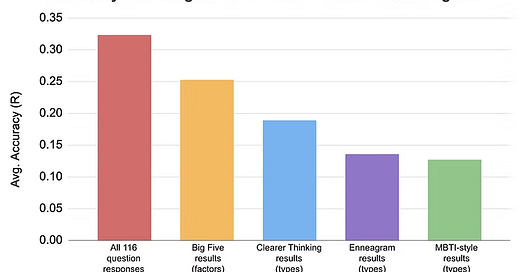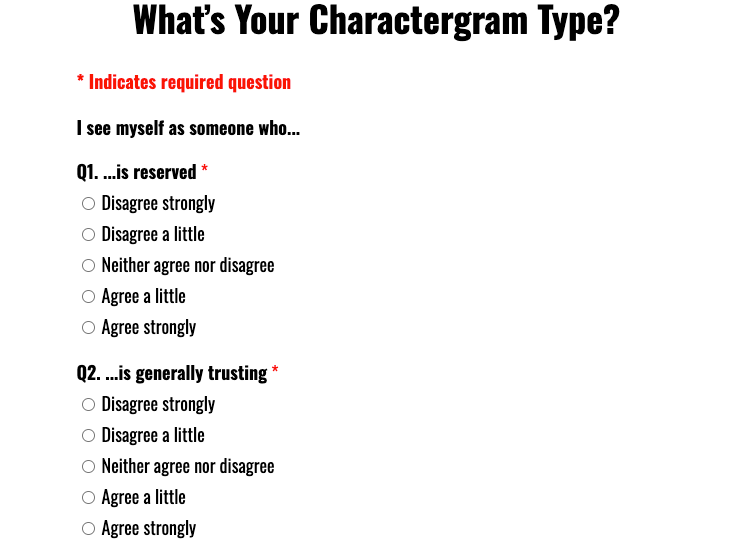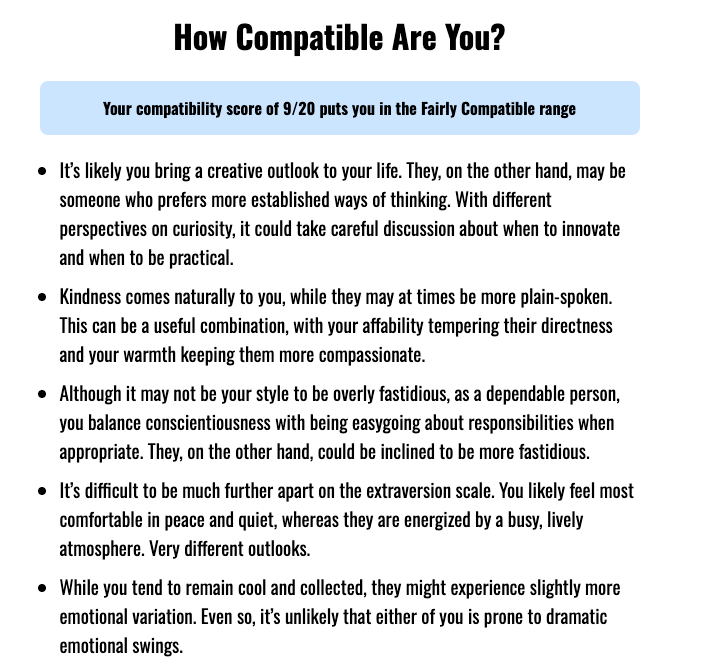Personal Science Week - 250313 Charactergram
A fast way to test your compatibility with another person
Personality tests are a useful way to take an inventory of yourself (or others), but they can be time-consuming. And how accurate are they anyway?
This week we’ll look at one fast, easy new test, plus survey some of what’s known about other personality tests.
Our long-time friend and networker in the Quantified Self world, Jon Cousins, is fond of quick and easy ways to track emotional and mental health, and recently he developed one of his best tests yet. Charactergram will only take you a few seconds to answer ten easy questions like these:
The results are returned anonymously and instantly. Another nice thing about the Charactergram test is that it distills your result into a simple 4-character word you can share and then compare to others.
For example, here’s how I score with one of my friends:
This seems roughly correct…but this rough sketch applies to my relationships with many people. Still, considering the test required only a few seconds, I think it’s better than nothing. And, like many of these personality inventories, I think of it as a useful conversation starter, a way to begin a discussion with somebody you want to work with.
Test yourself against me
Speaking of beginning a discussion, go ahead and use my 4-letter Charactergram HIDE to see how compatible you are with me.
Meanwhile, be sure to subscribe to Jon’s Substack for regular, easy-to-digest ideas about the psychology of personality.
ClearerThinking Personality Testing
Speaking of personality tests, the people at ClearerThinking offer dozens of online tests, some free and some paid, to test everything from personality to political bias to philosophical beliefs.
What makes ClearerThinking especially interesting is the compilations they regularly make based on the thousands of people who take their tests. Here’s one that collected results of 3500 people on various popular tests, and then measured them based on an independent scale of “life outcomes” (e.g. job satisfaction and wellbeing).
They concluded the the Big Five personality test is the most predictive, and the popular Myers-Briggs least predictive. (The most predictive, of course, was the one that covered every answer from all tests – but that’s not very interesting, since part of the reason for testing is to distill into a simpler model).
Personal Science Weekly Readings
We wrote about another personality test, Humantelligence, back in PSWeek240801. Used by HR departments, it’s a test that can help you see how to form compatible work groups.
What fingernails reveal about health: “horizontal ridges, known as Beau's lines, that run horizontally across their nails. This could indicate a deficiency such as insufficient protein.” and “leukonychia – are a sign of calcium deficiency” White flecks (leukonychia) probably don’t indicate nutritional deficiency.
Bill Gates predictions in his 1995 book The Road Ahead were remarkably prescient, anticipating even “the wallet PC” (what we now call a smartphone) including location-aware services and YouTube/TikTok-style video sharing
Check out 1DaySooner, a non-profit that’s trying to organize “high-impact” clinical trials, mostly for vaccines. In these “challenge trials”, volunteers are deliberately infected with a pathogen in order to test a vaccine or other treatment. Sign up here
About Personal Science
Why do you believe the things you believe? Whether it’s health, nutrition, safety, or matters of public policy, most of us rely on experts we trust. But how do you decide which experts? and how do you know if they’re right?
The scientific method, based on experiments, logical reasoning, and relentless questioning of assumptions, has proven over the long term to be among the most reliable ways to uncover the truth. Professional scientists do this for a living. Personal scientists think the same techniques should work for everyone.







Apparently we should "team up for creative, innovative thinking" 😛
According to Charactergram, we're highly compatible friends (no surprise there!): HIDE & SAGE
Your compatibility score of 18/20 puts you in the Highly Compatible range:
- Since you’re both high in curiosity, it’s probable that you’ll be great at teaming up for creative, innovative thinking. This willingness to explore new possibilities could make you ideal project collaborators and problem solvers.
- Both of you are kind, so you’re likely to come across as very affable in your interactions with others. You’ll probably get along together well too, so long as your shared kindness doesn’t get in the way of dealing with difficult issues.
- Although it may not be your style to be overly fastidious, as a dependable person, you balance conscientiousness with being easygoing about responsibilities when appropriate. They, on the other hand, could be inclined to be more fastidious.
- One of you seems rather more extravert than the other. While you may not be a total party animal, you probably feel energized by social interaction. They, however, are likely to thrive most in quieter environments.
- Zen-like calm might describe your approach to emotions—and theirs too. You’re both likely to take things in stride, though it’s worth making sure your steady nature doesn’t leave you overlooking others’ emotional needs.